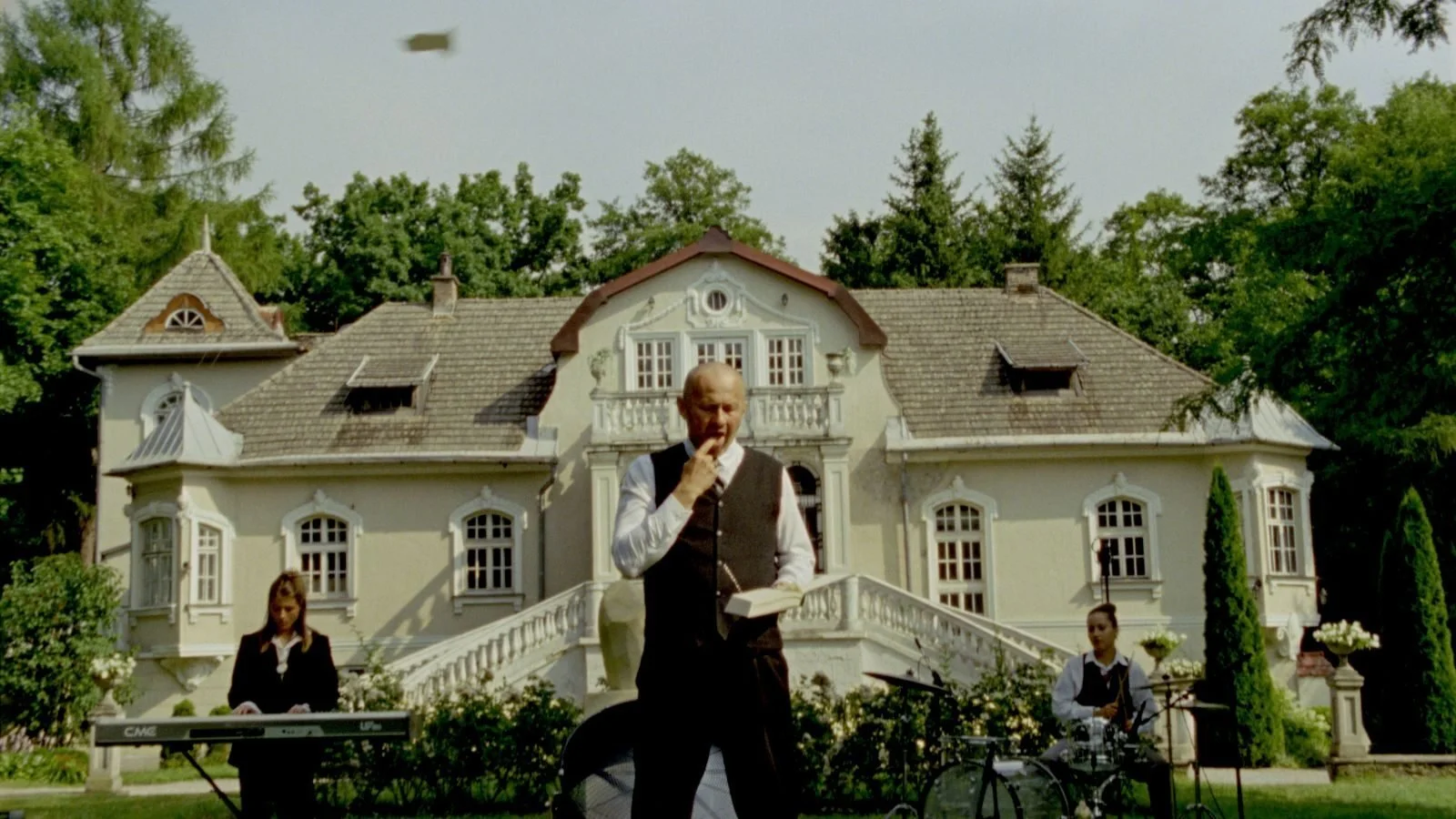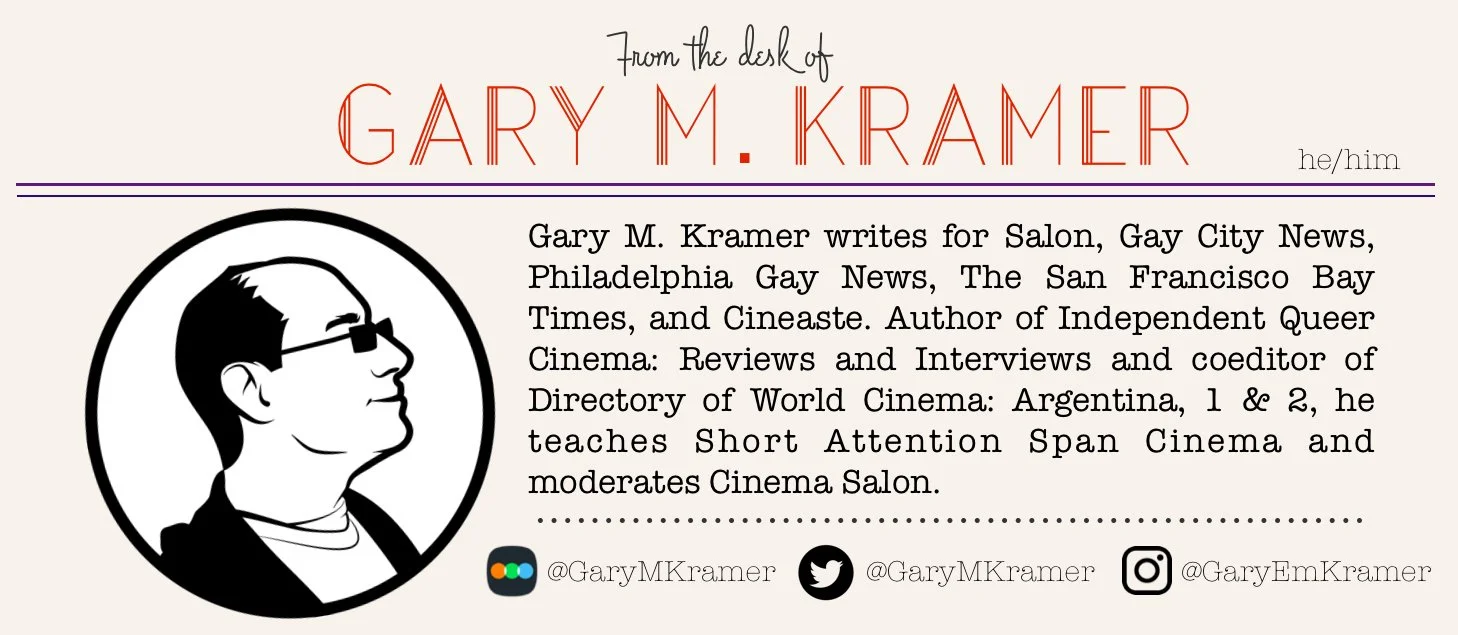New Directors New Films Fest 2025 Preview
by Gary M. Kramer, Staff Writer
The annual New Directors/New Films festival (ND/NF), held April 2-13 at MoMA and the Walter Reade Theater at Lincoln Center in New York City, is a showcase for debut and sophomore efforts by up-and-coming filmmakers. The selections tend to be a bit more experimental and challenging, but that is what makes them exciting; these filmmakers take risks, and they often yield riches. Moreover, the festival is an opportunity for moviegoers to discover some new film or director they probably would not know otherwise.
This year’s edition is a strong mix of features. Many films cover themes of grief and loss as well as isolation and alienation, and seeing the different approaches adds perspective along with layers of meaning.
Here is a rundown of seven films screening in this year’s ND/NF program.
Blue Sun Palace
Blue Sun Palace
Written and Directed by Constance Tsang
Tickets available here
Screens April 5 and 6, after ND/NF will play in select theaters, April 25
Constance Tsang’s quietly powerful debut feature, Blue Sun Palace, has a lovely opening sequence where Cheung (Lee Kang-sheng) and his girlfriend Didi (Xu Haipeng) are sharing a meal and stealing kisses. Cheung adores Didi, and his shy smile conveys how lucky he feels. Spending the night together, he embraces her body like a life raft. Didi works at a massage parlor with her best friend, Amy (Wu Ke-xi), who also values her company. It is, therefore, a shock—and kind of a spoiler—that Didi is murdered about 30 minutes into the film.
Blue Sun Palace spends the next 85 minutes charting how Cheung and Amy, both immigrants adrift in New York, cope with and connect over their grief. When Cheung takes Amy to the restaurant that he went to with Didi, and recalls her fondness for spicy chicken, it causes Amy more despair than comfort. Their companionship, which could turn into romance—and Cheung would probably welcome that—is full of bittersweetness. Herein lies Tsang’s magic; viewers will feel both the joy and meaning as well as the loss these characters feel following the tragedy. Lee Kang-sheng, a longtime muse of Tsai Ming-Liang, expresses Cheung’s loneliness palpably adding shading to his character when he reveals why he is in New York, and Wu Ke-xi is heartbreaking as Amy, especially during a sequence of her servicing a client at the massage parlor. Blue Sun Palace is an achingly poignant meditation on love, life, and loss, and Tsang films much of it with long static shots that let viewers really sit with the characters to absorb all of the freighted emotions.
Drowning Dry
Drowning Dry
Written and Directed by Laurynas Bareisa
Tickets here
New York Premiere, screens April 3 and 6
Lithuanian filmmaker Laurynas Bareisa made the astonishing short, Dummy, back in 2020. It showed his mastery as a filmmaker, and that skill is employed shrewdly in his intense sophomore feature, Drowning Dry.
Lukas (Paulius Makevicius) is an MMA fighter who heads off to a country house with his wife, Ernesta (Gelmine Glemzaite) and their young son, Kristafus (Herkus Sarapas) along with Ernesta’s sister Juste (Agne Kaktaite), her husband Tomas (Giedrius Kiela), and their young daughter Urte (Olivija Eva Viliüné). The families eat, swim, play, and hangout and then something devastating happens. Here, Bareisa cuts and flashes forward in time to a scene that makes sense after Drowning Dry goes back in time, repeats a few scenes with a few differences, and then picks up the narrative thread again. It is an uncanny approach, but it helps viewers recalibrate what has happened and how each character processes the aftermath of a tragedy. Bareisa wisely avoids using music, save a few pop songs, and this helps ratchet up the inexorable tension. He also coaxes natural, lived-in performances from the ensemble cast. A scene where Lukas and Tomas are sitting at a table, not speaking is disquieting. Drowning Dry is compelling because it presents a puzzle box that engages audiences and asking them to fill in the blanks and what is unspoken. The deep meanings embedded in this story about family and relationships demand to be unpacked.
No Sleep Till
No Sleep Till
Written and Directed by Alexandra Simpson
Tickets here
New York Premiere, Screens April 9 and 11
As a hurricane warning is announced, a handful of Floridians have no sense of urgency to evacuate. That is pretty much the plot of No Sleep Till, writer/director Alexandra Simpson’s hypnotic feature debut. This immersive, observant film washes over viewers as the main characters slowly come into focus. Will (Jordan Coley) tries to convince his buddy Mike (Xavier Brown-Sanders) to take a road trip to Philadelphia. June (Brynne Hofbauer), a teenager, works at a souvenir shop. And Taylor (Taylor Benton) is a storm chaser who goes by the handle “Tornado Genesis” and hopes to capture the impending hurricane on film. Simpson documents their quotidian lives which are interesting—or not. Taylor watches the night sky. June watches a bunch of skaters at a local park. And Will and Mike chat at the Magic Beach Hotel’s pool as a woman goes for a night swim. The storm, which is both feared and anticipated, provides some dramatic tension. Simpson’s film shows how these characters each exercise their freedom during this moment of crisis. The vibe is chill; nothing happens, but also everything happens. Viewers will find No Sleep Till either mesmerizing or tedious, but whatever one’s feelings, it is easy to appreciate Simpson’s many arresting images, from a gorgeous shot of a neon sign reflected in a pool, to abstract scenes of the skaters, and the wondrous images of the storm.
Stranger
Stranger
Written and Directed by Zhengfan Yang
Tickets here
New York Premiere, screens April 6 and 8
Stranger eavesdrops on its characters’ lives while also probing each individual with voyeuristic fascination. Almost all of the seven unconnected episodes are set in hotel rooms to show how people behave when they are alone and away from home. The opening sequence is a fantastic static shot of a housekeeper (Haoyan Zhang) seen cleaning a hotel room and bathroom. The next episode, also a static shot, has two men (Liguo Yang and Baohe Xue) being subjected to a surprise inspection by the police. As the men dodge the series of questions posed to them, the tension escalates. The camera finally moves in the third segment, where the guests are far more animated than the bride (Qiao Nie) and groom (Xuchun Xue) taking wedding photos. As the camera pans behind the couple, it reveals a secret romance. The fourth vignette is arguably the best. A pregnant wife’s (Mengjie Wang) conversation with her husband (Sisisi Han) is actually her practicing for an upcoming interview. But after these highlights, Stranger tries viewers’ patience in an overlong episode involving a young woman (Jing Jin) in quarantine and another underdeveloped segment featuring a street performer (Xiang Huang). Neither of these scenes deliver the emotional impact of the previous ones, which is a drawback. Yang ends Stranger with another static shot, a Rear Window-esque image of 12 hotel windows that also offers a glimpse into the private lives of multiple hotel guests, but like the film as a whole, it is only intermittently engaging.
The Assistant
The Assistant
Directed by Anka Sasnal and Wilhelm Sasnal
Written by Wilhelm Sasnal
Tickets here
North American Premiere, Screens April 5 and 6
This curious film, based on a celebrated 1908 novel, has Joseph Marti (Piotr Trojan) taking employment as an assistant to Mr. Tobler (Andrzej Konopka), an inventor in Baronswil, Poland. Arriving at Tobler’s villa, Joseph is initially impressed, but soon he realizes that the Toblers are on the decline. This is no cuckoo-in-the-nest story, where Joseph is going to seduce everyone for his own gain; it is a game of survival. Joseph’s job is unpaid because his mercurial boss has no money. (The power company keeps sending notices for past due payment, and the lights do go out at one point.) Tobler’s wife (Agnieszka Zulewska) sends Joseph mixed signals, flirting with him but also treating him cruelly. He is not always nice to her, as when he criticizes how she is raising her daughter. The film is intriguing in watching how Joseph adapts to this hothouse environment, trying to keep things running but also flexing some muscle. While some of the humor may not translate for American audiences, and the pacing is glacial, the filmmakers include some nice touches, from various anachronisms, such as a Joe Dallesandro portrait, to several interpretive dances that simply dazzle. One set to the Smith’s “I Don’t Owe You Anything,” is fun, and another features EDM music and strobe-lit naked cast. The Assistant takes a big swing, which is admirable, even though it is mostly uneven. Thankfully, Trojan makes Joseph empathetic even when the situations he finds himself in—like being force-fed by Mr. Tobler—are pathetic.
Listen to the Voices
Listen to the Voices
Directed by Maxime Jean-Baptiste
Written by Audrey Jean-Baptiste and Maxime Jean-Baptiste
Tickets here
New York Premiere, screens April 5 and 6
This short but significant Guianan film chronicles teenager Melrick Diomar’s summer with his grandmother Nicole. Melrick’s uncle, Lucas, a DJ was murdered in a violent attack in 2012, but the pain of his untimely death remain fresh for Nicole and Lucas’ best friend Yannick. Mixing documentary and fiction, director Maxime Jean-Baptiste immerses viewers in the lives of these three survivors as they each cope with the loss of a loved one. Yannick has a sense of survivor’s guilt, while Nicole—in a gripping 10-minute monologue (that Jean-Baptiste) films largely in close-ups—talks about her thoughts on revenge and forgiveness. The film also features vibrant drumming as Melrick participates in a musical performance dedicated to his late uncle. Listen to the Voices is a highly personal film, but it is heartfelt and told with care. The cinematography is at times, stunning, especially a fabulous sequence of a motorcycle ride at night. Jean-Baptiste is speaking out against the violence in Guiana while depicting how family members work through trauma. But he infuses his film with lovely moments of Melrick playing soccer, riding his bike, or swimming that offset some of the darker moments. There is hope here, and some catharsis, which is what makes this wistful film so engrossing.
Lost Chapters
Lost Chapters
Written and Directed by Lorena Alvarado
Tickets here
US Premiere, screens April 3 and 5
This slight, leisurely-paced film is as precious as a fragile old book. A fiction that at times feels like a documentary, writer/director Lorena Alvarado casts a mild spell on viewers. Her story can seem like a memory. Ena (Ena Alvarado, the director’s sister) returns to her family’s home in Caracas, where her father, Ignacio (Ignacio Alvarado, the director’s father), is on the hunt for rare Venezuelan books to start “The Museum of Venezuelan Books.” In her father’s library one day, Ena finds a note inside a volume that prompts her to search for a book by the author and composer Raphael Bolivar Coronado, who is rumored to have written many books under different pen names. As Ena searches for Elvia, a title he may have published, she and Ignacio browse various book stalls and ask questions. A subplot has Ena interacting with Mamama (Adele Rodríguez, her real-life grandmother), reciting and memorizing a favorite poem. The action in Lost Chapters unfolds in an unhurried nature featuring artfully composed scenes that unfold like the pages of a book being turned. The stakes here are quite low, but bibliophiles and cinephiles will be enchanted by the gentle rhythms as the characters simply read, wander, and reflect.
The annual New Directors/New Films festival begins April 2 until 13, schedule and tickets found here
Support MovieJawn Staff
–
Support MovieJawn Staff –
With the death of so much print media and meaningful journalism, it is important now more than ever to support the writers and outlets you love.
If you enjoyed this article, show your support by donating to our writer. All proceeds go directly to the writer. Recommended donation is $5.











